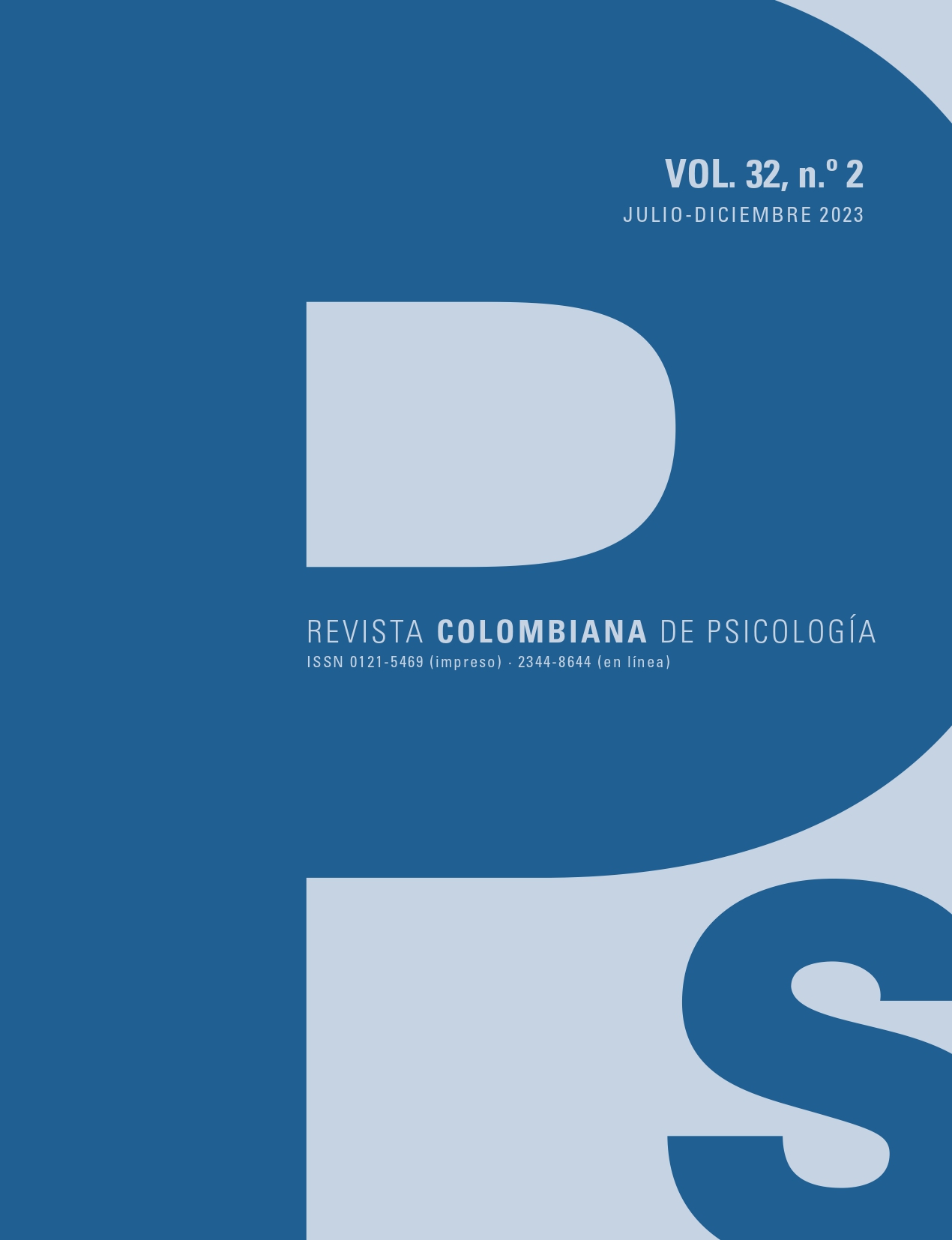Motivation and Strategies for Reading Comprehension in Middle School
Motivación y Estrategias para la Comprensión Lectora en la Enseñanza Fundamental
DOI:
https://doi.org/10.15446/rcp.v30n2.88781Keywords:
achievement goals, self-efficacy, learning strategies, linguistic abilities, psychoeducational assessment (en)objetivos de logro, autoeficacia, estrategias de aprendizaje, capacidad lingüistica, evaluación psicoeducativa (es)
Downloads
In this study, we investigated the relationships among achievement goals, self-efficacy, reading strategies, and the self assessment of performance in 47 Middle School students with control of the variable’s history of repetition, school year, and age. The differences in the students’ self-assessment regarding the practice of recreational reading were also analyzed. The students responded to three scales of the Multidimensional Battery of Reading Comprehension Self-Regulation.
Statistically significant correlations were identified among the motivational constructs, reading strategies, self-assessment, and achievement goals. We identified differences in the indices between the bivariate and partial correlations. The achievement goals were predictors of self-efficacy and reading strategies. These three constructs predicted the students’ self assessment in Portuguese language and reading comprehension. Students who practiced recreational reading presented a higher self-assessment than students who did not have this habit. It is suggested to continue the investigations on the theme and incorporate the findings of this study into the pedagogical practices that encourage reading.
How to cite this article: Ferraz, A. S., Inácio, A. L. M., Pinheiro, M. C., & dos Santos, A. A. A. (2021). Motivation and Strategies for Reading Comprehension in Middle School. Revista Colombiana de Psicología, 30(2), 71-86. https://doi.org/10.15446/rcp.v30n2.88781
En este estudio, investigamos la relación entre los objetivos de logro, la autoeficacia, las estrategias de lectura y la autoevaluación del desempeño de 47 estudiantes de la enseñanza fundamental, con control de las variables historial de repetición, años escolares y edad. Se analizaron las diferencias en la autoevaluación de los estudiantes en la práctica de la lectura recreativa. Los estudiantes respondieron tres escalas de la Batería Multidimensional de Autorregulación para la Comprensión Lectora. Identificamos diferencias en las correlaciones bivariadas y parciales entre construcciones motivacionales, estrategias de lectura, autoevaluación y entre objetivos de logro. Los objetivos de logro fueron predicen autoeficacia y estrategias de lectura. Estos tres constructos predijeron la autoevaluación en portugués y comprensión de lectura. Los estudiantes que practicaban lectura recreativa tuvieron una autoevaluación más alta en comparación con los estudiantes que no tenían este hábito. Se sugiere continuar las investigaciones sobre el tema e incorporar los hallazgos de este estudio en las prácticas pedagógicas de la lectura.
Cómo citar este artículo: Ferraz, A. S., Inácio, A. L. M., Pinheiro, M. C., & dos Santos, A. A. A. (2021). Motivación y Estrategias para la Comprensión Lectora en la Enseñanza Fundamental. Revista Colombiana de Psicología, 30(2), 71-86. https://doi.org/10.15446/rcp.v30n2.88781
References
Abd-El-Fatta, S. M. (2018). The Effect of Achievement Goals Profiles on Learning Approaches and Academic Achievement: A Multiple-Goals Perspective. International Journal of School and Cognitive Psychology, 5, 1-15. https://doi.org/10.4172/2469-9837.1000214
Ames, C. (1992). Classrooms: Goals, Structures, and Student Motivation. Journal of Educational Psychology, 84, 261-271. https://doi.org/10.1037/0022-0663.84.3.261
Anderman, E. M., Anderman, L. H., Yough, M. S., & Gimbert, B. G. (2010). Value-Added Models of Assessment: Implications for Motivation and Accountability. Educational Psychologist, 45, 123-137. https://doi.org/10.1080/00461521003703045
Bandura, A. (1978). Self-efficacy: Toward a Unifying Theory of Behavioral Change. Advances in Behaviour Research and Therapy, 1, 139-161. https://doi.org/10.1016/0146-6402(78)90002-4
Bandura, A., & Schunk, D. H. (1981). Cultivating Competence, Self-efficacy, and Intrinsic Interest Through Proximal Selfmotivation. Journal of Personality and Social Psychology, 41, 586-598. https://doi.org/10.1037/0022-3514.41.3.586
Baptista, R. M., Freitas Junior, P. V., Peçanha, A. P., Soares, A. B., & Mettrau, M. B. (2016). Práticas de leitura e compreensão de texto no 6º e 7º anos do ensino fundamental. Estudos de Psicologia, 33, 173-182. https://doi.org/10.1590/1982-027520160001000017
Butz, A. R., & Usher, E. L. (2015). Salient Sources of Early Adolescents’ Self-efficacy in Two Domains. Contemporary Educational Psychology, 42, 49-61. https://doi.org/10.1016/j.cedpsych.2015.04.001
Bzuneck, J. A., & Boruchovitch, E. (2016). Motivação e Autorregulação da Motivação no Contexto Educativo. Psicologia: Ensino & Formação, 7, 75-84. https://doi.org/10.21826/2179-58002016727584
Cardoso, L. R., & Bzuneck, J. A. (2004). Motivação no ensino superior: metas de realização e estratégias de aprendizagem. Psicologia Escolar e Educacional, 8, 145-155. Retrieved from http://pepsic.bvsalud.org/scielo.php?script=sci_arttext&pid=S1413-85572004000200003&lng=pt&tlng=pt
Cho, E., Toste, J. R., Lee, M., & Ju, U. (2018). Motivational Predictors of Struggling Readers’ Reading Comprehension: The Effects of Mindset, Achievement Goals, and Engagement. Reading and Writing,32, 1219-1242. https://doi.org/10.1007/s11145-018-9908-8
Cohen, J. (1988). Statistical Power Analysis for the Behavioral Sciences. New Jersey: Lawrence Erlbaum Associates.
Conselho Nacional de Saúde (Brasil). (2016). Resolução CNS 510, de 07 de abril de 2016. Retrieved from http://conselho.saude.gov.br/resolucoes/2016/Reso510.pdf
Dancey, C. P., & Reidy, J. (2013). Estatística sem matemática para psicólogos. Porto Alegre, RS: Penso Editora.
Darnon, C., Butera, F., Mugny, G., Quiamzade, A., & Hulleman, C. S. (2009). “Too Complex for Me!” Why Do Performance-approach and Performance-avoidance Goals Predict Exam Performance? European Journal of Psychology of Education, 24, 423-434. https://doi.org/10.1007/BF03178759
Elliot, A. J., & Murayama, K. (2008). On the Measurement of Achievement Goals: Critique, Illustration, and Application. Journal of Educational Psychology, 100, 613-628. https://doi.org/10.1037/0022-0663.100.3.613
Epçaçan, C., & Demírel, O. (2011). Validity and Reliability Study on the Scale of Belief Selfefficiency Reading Comprehension. The Journal of International Social Research, 4, 120-128. Retrieved from http://www.sosyalarastirmalar.com/cilt4/sayi16_pdf/epcacan_cevdet_ve_ozcanDemírel.pdf
Ferraz, A. S., & Santos, A. A. A. (2019). Construção da Bateria Multidimensional da Autorregulação para a Compreensão de Leitura. (Technical report unpublished). Campinas, SP: Universidade São Francisco.
Ferraz, A. S., Santos, A. A., & Almeida, L. S. (2019). Escala de Atribuições de Causalidade e Rendimento Escolar: Estudo de Evidência de Validade de Critério. Revista Portuguesa de Educação, 32, 125-139. https://doi.org/10.21814/rpe.14279
García M. A., Arévalo M. A., & Hernández C. A. (2018). La comprensión lectora y el rendimiento escolar. Cuadernos de Lingüística Hispánica, 32, 155- 174. Retrivied from http://www.scielo.org.co/pdf/clin/n32/2346-1829-clin-32-155.pdf
Goudeau, S., & Croizet, J. C. (2016). Hidden Advantages and Disadvantages of Social Class. Psychological Science, 28, 162-170. https://doi.org/10.1177/0956797616676600
Korpershoek, H., Kuyper, H., & van der Werf, G. (2014). Differences in Students’ School Motivation: A Latent Class Modelling Approach. Social Psychology of Education, 18, 137-163. https://doi.org/10.1007/s11218-014-9274
Lau, K. L. (2018). Hong Kong Senior Secondary Students’ Reading Motivation and Classical Chinese Reading Comprehension. Reading and Writing, 32, 963-982. https://doi.org/10.1007/s11145-018-9897-7
Ministério da Educação (Brasil). (2019) Base Nacional Comum Curricular. Retrieved from http://basenacionalcomum.mec.gov.br/images/BNCC_EI_EF_110518_versaofinal_site.pdf
Oliveira, K. L., Santos, A. A. A., & Rosa, M. T. (2016). Compreensão em Leitura no Ensino Fundamental. Psicologia: Ciência e Profissão, 36, 546-557. https://doi.org/10.1590/1982-3703001172014
Panadero, E., García-Pérez, D., & Fraile, J. (2018). Self-assessment for Learning in Vocational Education and Training. In S. McGrath, M. Mulder, J. Papier, & R. Suart (Eds.), Handbook of Vocational Education and Training: Developments in the Changing World of Work (pp. 1-12) Cham: Springer International Publishing.
Panadero, E., Jonsson, A., & Botella, J. (2017). Effects of Self-assessment on Self-regulated Learning and Self-efficacy: Four Meta-analyses. Educational Research Review, 22, 74-98. https://doi.org/10.1016/j.edurev.2017.08.004
Papinczak, T., Young, L., Groves, M., & Haynes, M. (2008). Effects of a Metacognitive Intervention on Students’ Approaches to Learning and Self-efficacy in a First Year Medical Course. Advances in Health Sciences Education, 13, 213-232. https://doi.org/10.1007/s10459-006-9036-0
Peixoto, F., Monteiro, V., Mata, L., Sanches, C., Pipa, J., & Almeida, L. S. (2017). Corrigendum: “To Be or not to Be Retained… That’s the Question!” Retention, Self-esteem, Self-concept, Achievement Goals and Grades. Frontiers in Psychology, 8, 12-33. https://doi.org/10.3389/fpsyg.2017.01233
Rastlegar, M., Kermani, E. M., & Khabir, M. (2017). The Relationship Between Metacognitive Reading Strategies Use and Reading Comprehension Achievement of efl Learners. Open Journal of Modern Linguistics, 7, 65-74. https://doi.org/10.4236/ojml.2017.72006
Richey, J. E., Bernacki, M. L., Belenky, D. M., & Nokes Malach, T. J. (2017). Comparing Class- and Task Level Measures of Achievement Goals. The Journal of Experimental Education, 86, 1-19. https://doi.org/10.1080/00220973.2017.1386155
Roomy, M., & Alhawsawi, S. (2019). Understanding Reading Strategies of efl Saudi Students. English Language Teaching, 12, 33-44. https://doi.org/10.5539/elt.v12n6p33
Santos, A. A. A., Moraes, M. S. D., & Lima, T. H. (2018). Compreensão de leitura e motivação para aprendizagem de alunos do ensino fundamental. Psicologia Escolar e Educacional, 22, 93-101. http://doi.org/10.1590/2175-35392018012208
Senko, C., & Dawson, B. (2017). Performance-approach Goal Effects Depend on How They are Defined: Meta-analytic Evidence From Multiple Educational Outcomes. Journal of Educational Psychology, 109, 574-598. http://doi.org/10.1037/edu0000160
Senko, C., & Hulleman, C. S. (2013). The Role of Goal Attainment Expectancies in Achievement Goal Pursuit. Journal of Educational Psychology, 105, 504-521. https://doi.org/10.1016/j.actpsy.2013.07.012
Senko, C., Hulleman, C. S., & Harackiewicz, J. M. (2011). Achievement Goal Theory at the Crossroads: Old Controversies, Current Challenges, and New Directions. Educational Psychologist, 46, 26-47. https://doi.org/10.1080/00461520.2011.538646
Stack, M. H., Moorefield-Lang, H., & Barksdale, M. A. (2015). Able: An Instrument for Assessing Elementary Students’ Perceptions of Access to Books, Beliefs, and Literacy Environment. Reading Psychology, 36, 499-518. https://doi.org/10.1080/02702711.2014.893275
Unrau, N. J., Rueda, R., Son, E., Polanin, J. R., Lundeen, R. J., & Muraszewski, A. K. (2017). Can Reading Self-Efficacy Be Modified? A Meta-analysis of the Impact of Interventions on Reading Self-efficacy. Review of Educational Research, 20, 1-38. https://doi.org/10.3102/0034654317743199
White, M. C., & DiBenedetto, M. K. (2015). Self-regulation and the Common Core: Application to Ela Standars.New York: Routledge.
Yogurtsçu, K. (2013). The Impact of Self-efficacy Perception on Reading Comprehension on Academic Achievement. Procedia, 70, 375-386. https://doi.org/10.1016/j.sbspro.2013.01.075
Zenorini, R. P. C., & Santos, A. A. A. (2010). Escala de Metas de Realização como Medida da Motivação para Aprendizagem. Interamerican Journal of Psychology, 44, 291-298. Retrivied from https://www.redalyc.org/pdf/284/28420641010.pdf
Zenorini, R. P. C., Santos, A. A. A., & Monteiro, R. M. (2011). Motivação para aprender: relação com o desempenho de estudantes. Paidéia (Ribeirão Preto), 21, 157-164. https://doi.org/10.1590/S0103-863X2011000200003
How to Cite
APA
ACM
ACS
ABNT
Chicago
Harvard
IEEE
MLA
Turabian
Vancouver
Download Citation
CrossRef Cited-by
1. Junaidi Mistar, Alfan Zuhairi. (2023). Proceedings of the International Conference on Education, Humanities, and Management (ICEHUM 2022). Advances in Social Science, Education and Humanities Research. 741, p.138. https://doi.org/10.2991/978-2-38476-040-4_14.
2. Ahlam Lee. (2024). The Relation between Motivation and Goal Attainment: A Correlational Meta‐Analysis. Japanese Psychological Research, 66(2), p.114. https://doi.org/10.1111/jpr.12486.
3. Meihua Liu. (2023). University Students’ Dynamic Motivation to Learn Chinese as a Second Language. Sage Open, 13(4) https://doi.org/10.1177/21582440231207450.
4. Marilu Delfina Mosquito-Melendez, David Salomon Quispe-Choqque. (2025). Estrategias de Enseñanza en una Educación Virtual Pospandemia. Revista Docentes 2.0, 18(1), p.443. https://doi.org/10.37843/rted.v18i1.651.
Dimensions
PlumX
Article abstract page views
Downloads
License
Copyright (c) 2021 Revista Colombiana de PsicologíaThe RCP is published under the Creative Commons license and can be copied and reproduced according to the conditions of this license (http://creativecommons.org/licenses/by-nc-nd/2.5). RCP articles are available online at https://revistas.unal.edu.co/index.php/psicologia/issue/archive. If you would like to subscribe to the RCP as reader, please go to https://revistas.unal.edu.co/index.php/psicologia/information/readers and follow the instructions mentioned in the webpage. Additionally, a limited number of print journals are available upon request. To request print copies, please email revpsico_fchbog@unal.edu.co.


























